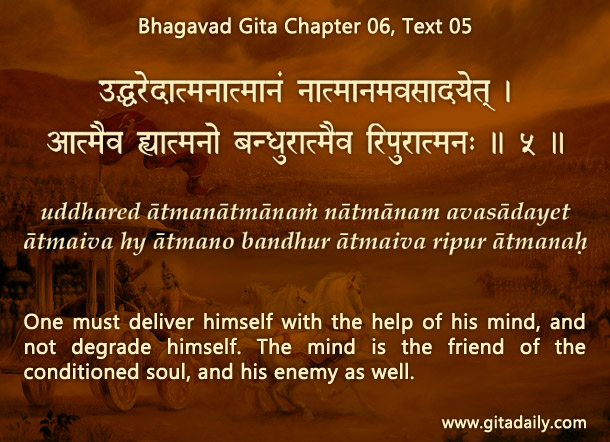The Bhagavad Gita states that the greatest problem with focusing our mind is that it presently acts as our enemy. Interestingly, the Gita does not urge us to destroy this enemy of the mind, as it urges us to destroy the enemy of lust, for example, in 3.43; instead, it encourages us to elevate ourselves with our mind in 6.5 and assures us that the mind, when controlled, can be our friend in 6.6.
Normally, we do not associate controllership with friendship. If someone controls us, we won’t consider them our friend but our master. Conversely, if we have to control someone, we would consider them as our servant or our ward, not our friend. The point of this striking juxtaposition of ideas—that the mind is an enemy but is not to be terminated but transformed into a friend—is central to understanding both the challenge and the opportunity presented by meditation.
It is when we try to focus on one thought, one point, or one mantra that we realize how restless our mind is, and how reasonless it can be in rejecting our desire and aspiration to focus on Krishna, the Supreme Lord. Thus, we understand that the mind acts like an enemy. Simultaneously, however, the mind is an essential functional tool for the energy of the soul, its consciousness, to function in this world. To think, to feel, and to will are all functions of the subtle body within which the mind plays a critical and indispensable role. Therefore, we need the mind to function in the world for our survival as well as for our service to the Lord.
That’s why the best way to look at the mind—while keeping a vigilant eye on it—is to treat it like a child who we need to parent into a responsible adult but who is also prone to terrible temper tantrums, which can lead to episodes of degradation and even destruction.
By adopting this mood of parenting the mind, we can combine both kindness and watchfulness in refocusing the mind with the necessary firmness, but without any unnecessary anger whenever it gets distracted, as it inevitably will.
Summary:
– The mind can act like an enemy, yet it can also be our friend.
– We need the mind to function in the world; thus, it is best to view the mind as a child we need to parent.
– We should combine kindness and watchfulness in refocusing the mind firmly yet not furiously whenever it wanders.
Think it over:
– How does the Gita treat the mind differently from a typical enemy?
– Why is the mind different from an enemy that we can destroy?
– What is the best metaphor and method for dealing with the mind, especially while meditating?
06.05 One must deliver himself with the help of his mind, and not degrade himself. The mind is the friend of the conditioned soul, and his enemy as well.


Leave A Comment